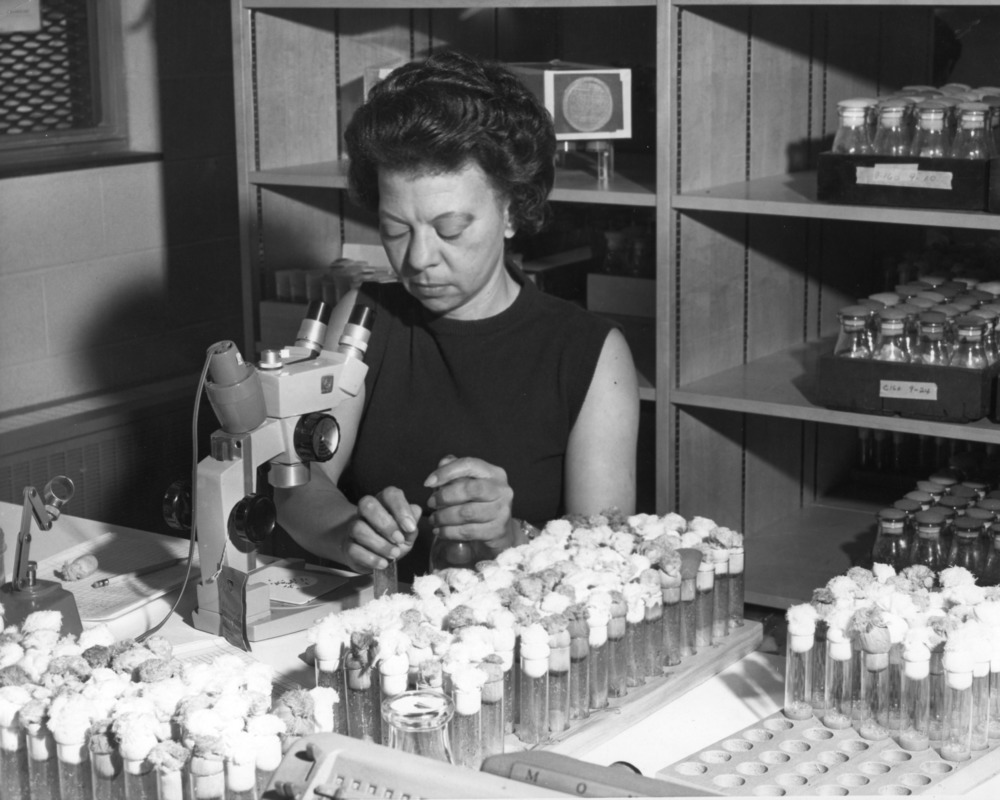
Remembering Justina Williams
Special Collections staff recently received a special visit from the family of a woman who made history at NC State. Justina Harris Williams was the first African American to be hired as academic staff at NC State, and the first African American to be hired above the level of custodial staff at the university. Williams became a research technician in the Genetics Department in 1958, two years before the first African American undergraduate students graduated from NC State, and she retired 30 years later as Head Research Technician for the department. She passed away in 2003.

Dr. Schaffer shared that, "I met Justina in July 1959 and she was working in a Drosophila lab in a Genetics research project. She was working for Prof. Ken-ichi Kojima. She was always pleasant, positive, hard working, and developed an array of skills over the years." Schaffer also shared that at the time he began working, the only other African American staff members in Gardner Hall were male custodians, resulting in three categories of restrooms: "White Men," "White Women," and "Colored Men." This left Williams with the only option to use the restroom marked for white women, which provoked a white female secretary in another department to complain to Chancellor Cary Bostian, threatening to quit her job. According to Dr. Schaffer, "Chancellor Bostian expressed his sorrow at how much the situation had affected [the white secretary] negatively, and then asked something like, 'And where should we send your last pay check?'"
During their visit to the Special Collections Research Center, Williams's family shared photographs kept in a scrapbook, including an image of Williams as a student in a class at NC State. Although she did not hold a degree beyond the high school level, she educated herself through classes at Shaw University, Hampton Institute, and NC State, and her family states that her knowledge of the field of genetics exceeded the graduate level.
Dr. Regina Joice Cordy arranged the visit for her family as part of a family reunion in Raleigh. She followed in her grandmother's footsteps as a scientist, earning her Ph.D. in Biology from Harvard in 2013. She dedicated her Ph.D. dissertation to her grandmother, saying "She is one of my greatest inspirations and I thank her and so many others for breaking down barriers so that I can be where I am today."
Dr. Joice Cordy shared the following reflection on her grandmother's role in her life: "The significance of my grandmother’s role as the first African-American hire at NC State University in 1958 is not lost on me. I have often thought of her during my tough days in my journey in science. Even though she passed away in 2003, just weeks before I declared my undergraduate major in Biology, I work to carry her spirit with me since I know that I owe this journey to her and her trailblazing efforts. I entered Harvard University as a graduate student in 2007-2008 school year, fifty years after my grandmother made history as the first black academic hire are NC State."
Dr. Joice Cordy continues, "While sitting at my desk taking a break from running PCRs or doing cell culture, I would find myself periodically googling her name and would stumble upon an academic paper in which she was listed in the acknowledgement section. Then I would read through the paper a bit, and imagine her looking through the microscope at fruit flies, and working in the lab with other researchers. Then, one day, I found a new link - a historical archive featuring my grandmother in the timeline of important events in African-American history at NC State. I was so excited to see it, that I printed out the picture and posted it at my desk. Throughout grad school, I would look at that picture and I cannot put in words just how much inspiration I derived from it. When I completed my PhD in 2013, I dedicated it to my grandmother, as I felt it was important to recognize her name since my journey would not be possible without the work that she and others did to pave the way for my generation."
 Following their visit with Dr. Schaffer and Dr. Mackay, the family met with archivists and viewed the original photograph of Justina Williams in the laboratory, as well as documents from the Department of Genetics records.
Following their visit with Dr. Schaffer and Dr. Mackay, the family met with archivists and viewed the original photograph of Justina Williams in the laboratory, as well as documents from the Department of Genetics records.
Gerri Williams Joice shared that, "I want to express how much I appreciate that so many people at the university acknowledge that in 1958, my mom was the first African American hired on the Academic Staff. I want to express special thanks to Dr. Henry Schaffer for being able to recall and help us understand so many aspects of the campus environment and climate in the 1950s and 1960s and the significance of my mom’s efforts as a pioneer in breaking down the racial barriers that existed during that time.”
We are grateful to have met the family of a woman who helped to chart new paths for women and African Americans at NC State. To explore more about Justina Williams and the history of women and African Americans at NC State please visit our Historical State Timelines, our collection guides, and Rare & Unique Digital Materials. And as always, please contact us if you would like to learn more about NC State University history or about Special Collections at NC State.




